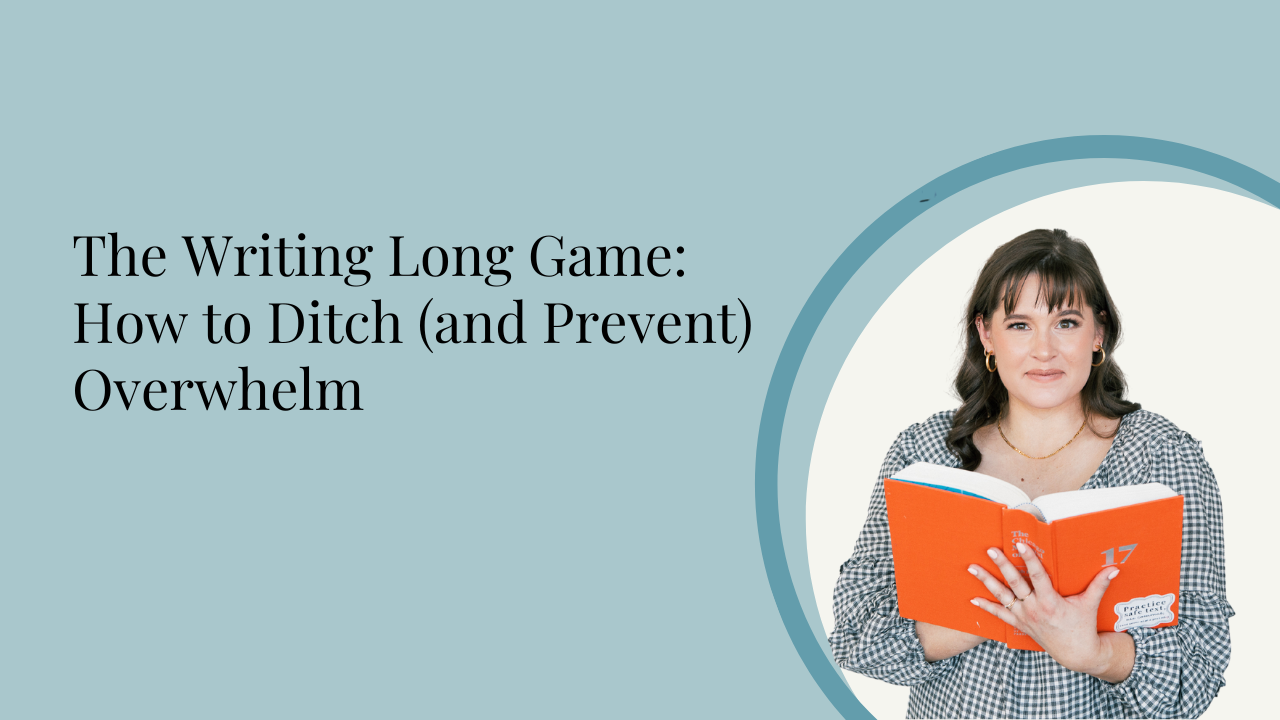The Writing Long Game: 3 Ways to Ditch (and 3 Ways to Prevent) Overwhelm
A couple of times a year, I get so fed up with the mess in my house. I hate all of our stuff, I want to throw everything out, and I usually end up yelling a bit. Sometimes that burn-it-down energy leads to actual action (not arson, but deep cleaning—much more legal), and I declutter, deep clean, and feel like I’m on The Home Edit for a hot minute.
But guess what?
It doesn’t last for long. I’ll have energy for maybe one room or energy for one afternoon, and then I realize the scope of the project, freeze, and slowly step away, leaving my lived-in home to its own devices.
Maybe your writing is similar.
The Writing Long Game
Maybe you have grand ideas for the story you want to write. You envision the endgame: the signed publishing contract, the ARCs, the book tour, stopping in at your local indie every week to sign copies of your bestselling memoir. And here’s the thing: That vision is good. It’s good to picture the endgame, because it’s the endgame that keeps you focused and injects your momentum when you need a boost. But envisioning the endgame isn’t enough to make it happen.
You have to play the long game first.
The Writing Long Game will be a series that we dip into every now and then to help you adjust your mindset, reset your expectations, and set yourself up for both short-term and longterm success. Today we’ll tackle the burn-it-down energy you’ll run into while you write.
Writing Overwhelm
Here’s the thing: Writing is overwhelming. It just is—not all the time, but you will, at some point, feel overwhelmed in your writing process. This is normal. I’ll repeat this:
Overwhelm is normal.
Writing overwhelm can present a few different ways:
No motivation to sit down and write
Doubting the value of the pages you’ve already written
Minimizing the story you have to tell
Mental fog over what to write next
A burning desire to delete everything and start over
Strong urges to throw your computer against a wall and swear off of writing forever.
This is normal. Is it fun? Probably not. But it also doesn’t mean that anything is wrong with you or with your story. It just means that you’re overwhelmed.
3 Ways to Deal with Overwhelm
When you hit overwhelm, your first job is to reset your mind (not drag your manuscript file to the trash icon).
Step away from the computer. Don’t trust yourself with your manuscript when you’re overwhelmed. You’re more likely to write words that will frustrate you and you’ll end up deleting anyway, and working on a manuscript that is already making you overwhelmed will not help you ditch that overwhelm. Step away.
Do something you love. One of the best ways to ditch overwhelm is to rely on activities and places that light you up. Go on a hike, head to your favorite local independent bookstore, bake some brownies, drive to the coast for a day, go out with a friend, talk to your sister, buy some flowers, go to the movies, take a nap. Whatever you do, make sure it’s something you love. Getting out of your head and into your body will benefit both your mind and your manuscript.
Identify the next right thing your manuscript needs. And no, the next right thing can’t be, Stop writing crap. Your next right thing needs to be small (whatever you’re thinking, go smaller) and immediately actionable. The more you can break your writing into small steps, the more accessible it will be to your tired, overworked brain.
Maybe your next right thing is drafting a character sheet for that character whose motivations elude you. It could be referencing your book map to reorient yourself within your story. It could be revisiting your thesis to remind yourself why you’re writing. Your next right thing could be consulting an editor, because sometimes you just need a professional to tell you what to do next. (Psst! I do offer manuscript consults if that’s your next right thing.) Whatever you do, make it small and make it something that you can do right now.
3 Ways to Prevent Overwhelm
Have a thesis. A thesis for your manuscript will keep you focused and your writing centered. A strong thesis will prevent tangents, rabbit trails, and burn-it-down writing energy. If you don’t have a thesis yet, stop writing your manuscript and draft a thesis.
Have an outline. Personally, I like book maps for outlines. A book map will help you see your manuscript from a bird’s-eye view. You can see where you’ve been, where you are, and where you’re going next. A book map is just that—a map, so that you can know where you are always.
Consult an editor. A good editor is your partner, will snap you out of burn-it-down energy, can see holes in your manuscript that you can’t see yet. I know it feels counterintuitive, but connecting with an editor at the beginning of your writing will make the rest of your writing process a little less hard, a little less frustrating, a little less overwhelming. Editors are here to guide you, support you, and walk alongside you as you write. Look for an editor who has consult options if you don’t want to commit longterm to an editorial partnership yet.
Take a deep breath, writer. In the moment, overwhelm can feel like the end of the road. But really? It’s just that annoying roadwork with the construction workers who redirect traffic for a bit. It’s okay. Your story does matter.
You’ve got this.


